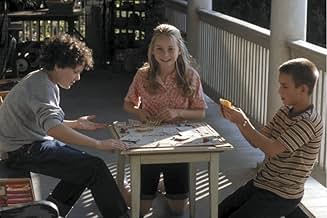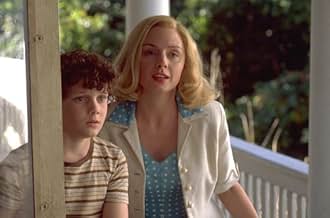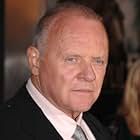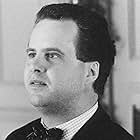A young boy's life changes for the better when a mysterious man with psychic powers moves into the family home that he shares with his widowed mother.A young boy's life changes for the better when a mysterious man with psychic powers moves into the family home that he shares with his widowed mother.A young boy's life changes for the better when a mysterious man with psychic powers moves into the family home that he shares with his widowed mother.
- Awards
- 2 wins & 8 nominations total
Timothy Reifsnyder
- Harry Doolin
- (as Timmy Reifsnyder)
Joe Blankenship
- Richie O'Rourke
- (as Joe T. Blankenship)
Joel Haberli
- Sully's Dad
- (as Joel F. Haberli)
- Director
- Writers
- All cast & crew
- Production, box office & more at IMDbPro
Storyline
Did you know
- TriviaSir Anthony Hopkins discussed psychic ability and synchronicity with director Scott Hicks in an interview included on the DVD. In that exchange, he tells how he had been in Florence, filming Hannibal (2001), and reading a non-fiction book by William Goldman. In the book, Goldman discussed previously working with Hopkins, and discussed Kathy Bates in Misery (1990). Hopkins recalled thinking that it would be interesting to work with Goldman again, and it would be interesting to work on a Stephen King story. Two days later, a call came that there was a script for him to read, by Goldman, based on a King story. Hopkins accepted immediately.
- GoofsThe shot is flipped at the end of the movie when Bobby is riding his Schwinn bike. The kickstand is on the right side and the chain on the left (at around 1h 35 mins), opposite of where they should be (at 15:32-15:56). Also, note that one can clearly see the name "Schwinn" reversed on the side of the bike in this scene (at around 1h 35 mins).
- Crazy creditsThanks to the citizens of Richmond and Staunton, Virginia
- ConnectionsFeatured in Siskel & Ebert: Hearts in Atlantis/The Killing Yard/Dinner Rush (2001)
- SoundtracksAin't That a Shame
Written by David Bartholomew (as Dave Bartholomew), Fats Domino (as Antoine "Fats" Domino)
Performed by Fats Domino
Courtesy of EMI Records
Under license from EMI-Capitol Music Special Markets
Featured review
One of the many acting skills Anthony Hopkins possesses is the ability to attract and disturb at the same time; he can charm you to no end with sly smiles and unspoken allure. But all the while he's hiding something unsettling that you can't ever quite figure out. In Hearts in Atlantis, the latest of what by now must be a truly massive box set of Stephen King film adaptations, Sir Anthony finds a writer perfectly suited to these unique talents. What we see is a movie eerie and enchanting, both in mood and in style -- a story that holds onto its cards throughout, letting you see each of them slowly, one by one, and only when absolutely necessary. In the end we find we have been held captive by a stunningly memorable and powerful film.
The story begins as a retrospective: Robert Morse plays the older version of Bobby Garfield, the central character of this reminiscent story. It takes a recent tragedy to send the older Bobby unwittingly in the mind to his days as an 11-year-old in 1960. There we go to a place common to almost all of King's stories: rural New England, where Bobby lives with his mother (Hope Davis), and spends his innocent, aimless days with his two friends Sully (Will Rothhaar) and Carol (Mika Boorem). His father died when Bobby was only five, and his mother is so busy hopefully tending to a real estate career that she has little time to tend to her only child. To this point nothing is out of the ordinary; this childhood is deliberately portrayed with hazy, warm undertones, akin to the sense of youth so familiar to many who look back upon it.
Fairly early on we meet Ted Brautigan (Hopkins), a boarder who shows up quite suddenly on their porch, his belongings in grocery bags. He is clean, well-spoken, unobtrusive and generally a placid sort. But he is also an instant enigma: he is of unknown origin, means, and intent, and Bobby's mother quickly decides this is a man to be viewed with caution. Bobby, on the other hand, innocently curious --and most likely desperate for anything that could spell the boredom of his uneventful summer-- decides this a man worth knowing. They become close, Brautigan dispersing kennels of wisdom and even offering young Bobby a dollar a week and cold root beers to read him the newspaper daily. But Brautigan clearly has a special quality about him: he can sense things and see things that are not readily apparent to most others. Bobby seems to have this gift as well, though in a lees pronounced way, and through this they form a bond, one Bobby's mother slowly and begrudgingly affords him. She's suspicious of this man still, while we the viewers begin gradually to glean some of the mysteries of his past. I don't dare say what they are, but they do involve "the Low Men", people, Brautigan warns Bobby, who may some day come looking for him. He tells Bobby what signs to look for about town, gently using the boy as a scout of imminent danger. Bobby does not know who they are or what they represent. Neither do we, for a long time, but the key instrument of this story is to make it intentionally vague. We are not to be concerned about these details, but rather to know that Brautigan has experienced them, and will do whatever he can to shield Bobby and his youth from the corrupting darkness looming behind them.
Stephen King has been widely read as an author of horror and suspense, but his best works --like this one-- work on a much more insidious level, evoking a sense of foreboding and unknown that manages to inform everything that happens within. The makers of this film find great success emphasizing the shady murkiness of the story, and they still manage to keep things centered. The mysteries of Ted Brautigan find parallels in the wonders of youth: Bobby experiences his first kiss, naturally, encounters a menacing bully, and learns to view his mother in evolving ways...grown-up ways. This is really a story of innocence and maturity, of youth's purity and the dangers that lurk at its end. Bobby finds that end to a certain degree, but along the way finds friendship, knowledge, and a sense of the mysteries of adulthood that await him. Ted Brautigan is really more than a friend to Bobby; he is a guide, a protector, and a teacher. These two actors provide real, natural on screen chemistry in this film, and there is one delightful scene early on where Brautigan intensely relives for Bobby a glory day of Chicago Bears football lore. This is an actor who can take any available strengths of writing and magnify them for us viewers who watch him say them aloud. As a result Anthony Hopkins anchors this infectious little film to the ground while still allowing it to soar skyward when needed.
The story begins as a retrospective: Robert Morse plays the older version of Bobby Garfield, the central character of this reminiscent story. It takes a recent tragedy to send the older Bobby unwittingly in the mind to his days as an 11-year-old in 1960. There we go to a place common to almost all of King's stories: rural New England, where Bobby lives with his mother (Hope Davis), and spends his innocent, aimless days with his two friends Sully (Will Rothhaar) and Carol (Mika Boorem). His father died when Bobby was only five, and his mother is so busy hopefully tending to a real estate career that she has little time to tend to her only child. To this point nothing is out of the ordinary; this childhood is deliberately portrayed with hazy, warm undertones, akin to the sense of youth so familiar to many who look back upon it.
Fairly early on we meet Ted Brautigan (Hopkins), a boarder who shows up quite suddenly on their porch, his belongings in grocery bags. He is clean, well-spoken, unobtrusive and generally a placid sort. But he is also an instant enigma: he is of unknown origin, means, and intent, and Bobby's mother quickly decides this is a man to be viewed with caution. Bobby, on the other hand, innocently curious --and most likely desperate for anything that could spell the boredom of his uneventful summer-- decides this a man worth knowing. They become close, Brautigan dispersing kennels of wisdom and even offering young Bobby a dollar a week and cold root beers to read him the newspaper daily. But Brautigan clearly has a special quality about him: he can sense things and see things that are not readily apparent to most others. Bobby seems to have this gift as well, though in a lees pronounced way, and through this they form a bond, one Bobby's mother slowly and begrudgingly affords him. She's suspicious of this man still, while we the viewers begin gradually to glean some of the mysteries of his past. I don't dare say what they are, but they do involve "the Low Men", people, Brautigan warns Bobby, who may some day come looking for him. He tells Bobby what signs to look for about town, gently using the boy as a scout of imminent danger. Bobby does not know who they are or what they represent. Neither do we, for a long time, but the key instrument of this story is to make it intentionally vague. We are not to be concerned about these details, but rather to know that Brautigan has experienced them, and will do whatever he can to shield Bobby and his youth from the corrupting darkness looming behind them.
Stephen King has been widely read as an author of horror and suspense, but his best works --like this one-- work on a much more insidious level, evoking a sense of foreboding and unknown that manages to inform everything that happens within. The makers of this film find great success emphasizing the shady murkiness of the story, and they still manage to keep things centered. The mysteries of Ted Brautigan find parallels in the wonders of youth: Bobby experiences his first kiss, naturally, encounters a menacing bully, and learns to view his mother in evolving ways...grown-up ways. This is really a story of innocence and maturity, of youth's purity and the dangers that lurk at its end. Bobby finds that end to a certain degree, but along the way finds friendship, knowledge, and a sense of the mysteries of adulthood that await him. Ted Brautigan is really more than a friend to Bobby; he is a guide, a protector, and a teacher. These two actors provide real, natural on screen chemistry in this film, and there is one delightful scene early on where Brautigan intensely relives for Bobby a glory day of Chicago Bears football lore. This is an actor who can take any available strengths of writing and magnify them for us viewers who watch him say them aloud. As a result Anthony Hopkins anchors this infectious little film to the ground while still allowing it to soar skyward when needed.
- bigtommytahoe
- Jun 15, 2005
- Permalink
- How long is Hearts in Atlantis?Powered by Alexa
Details
- Release date
- Country of origin
- Official site
- Language
- Also known as
- Nostalgia Del Pasado
- Filming locations
- Production companies
- See more company credits at IMDbPro
Box office
- Budget
- $31,000,000 (estimated)
- Gross US & Canada
- $24,185,781
- Opening weekend US & Canada
- $9,021,494
- Sep 30, 2001
- Gross worldwide
- $30,919,415
- Runtime1 hour 41 minutes
- Color
- Sound mix
- Aspect ratio
- 2.35 : 1
Contribute to this page
Suggest an edit or add missing content























